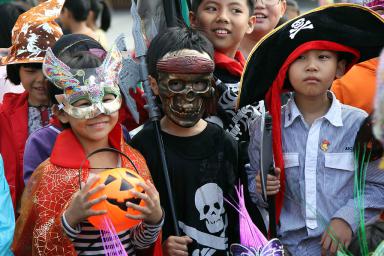Halloween is a secular holiday combining vestiges of traditional harvest festival celebrations with customs more peculiar to the occasion such as costume wearing, trick-or-treating, pranksterism, and decorative imagery based on the changing of the seasons, death, and the supernatural. It takes place on October 31.
Though it was regarded up until the last few decades of the 20th century as primarily a children's holiday, in more recent years activities such as costume parties, themed decorations, and even trick-or-treating have grown increasingly popular with adults as well, making Halloween a celebration for all ages.
What does the name 'Halloween' mean?
The name Halloween (originally spelled Hallowe'en) is a contraction of All Hallows Even, meaning the day before All Hallows Day (better known today as All Saints Day), a Catholic holiday commemorating Christian saints and martyrs observed since the early Middle Ages on November 1.
How and when did Halloween originate?
According to the best available evidence, Halloween originated as a Catholic vigil observed on the eve of All Saints Day, November 1, in the early Middle Ages.
It has become commonplace to trace its roots even further back in time to a pagan festival of ancient Ireland known as Samhain (pronounced sow'-en or sow'-een), about which little is actually known. The prehistoric observance is said to have marked the end of summer and the onset of winter, and was celebrated with feasting, bonfires, sacrificial offerings, and homage to the dead.
Despite thematic similarities, there's scant evidence of any real historical continuity linking Samhain to the medieval observance of Halloween, however. Some modern historians, notably Ronald Hutton (The Stations of the Sun: A History of the Ritual Year in Britain, 1996) and Steve Roud (The English Year, 2008, and A Dictionary of English Folklore, 2005), flatly reject the popular notion that the Church designated November 1st All Saints Day to "Christianize" the pagan Celtic holiday. Citing a lack of historical documentation, Roud goes so far as to dismiss the Samhain theory of origin altogether.
"Certainly the festival of Samhain, meaning Summer's End, was by far the most important of the four quarter days in the medieval Irish calendar, and there was a sense that this was the time of year when the physical and supernatural worlds were closest and magical things could happen," Roud notes, "but however strong the evidence in Ireland, in Wales it was May 1 and New Year which took precedence, in Scotland there is hardly any mention of it until much later, and in Anglo-Saxon England even less."
It seems reasonable to conclude that the connection between Halloween and Samhain has, at the very least, been overstated in most modern accounts of the holiday's origin.
Earliest Halloween customs
The earliest documented customs attributable to Halloween proper grew out of the tandem observances of All Saints Day (November 1), a day of prayer for saints and martyrs of the Church, and All Souls Day (November 2), a day of prayer for the souls of all the dead. Among the practices associated with Halloween during the Medieval period were the lighting of bonfires, evidently to symbolize the plight of souls lost in purgatory, and souling, which consisted of going door-to-door offering prayers for the dead in exchange for "soul cakes" and other treats. Mumming, a custom originally associated with Christmas consisting of parading in costume, chanting rhymes, and play-acting, was a somewhat later addition to Halloween.
Again, however, despite the obvious similarities between old and new, it may be an exaggeration to say these medieval customs "survived" to the present day, or even that they "evolved" into modern Halloween practices such as trick-or-treating. By the time Irish immigrants brought the holiday to North America in the mid-1800s, mumming and souling were all but forgotten in Ireland itself, where the known Halloween customs of the time consisted of praying, communal feasting, and playing divination games such as bobbing for apples.
The secular, commercialized holiday we know in America today would be barely recognizable to Halloween celebrants of even just a century ago.




